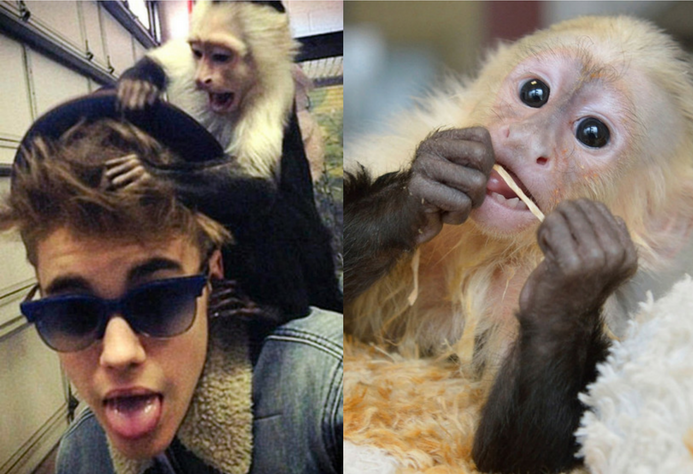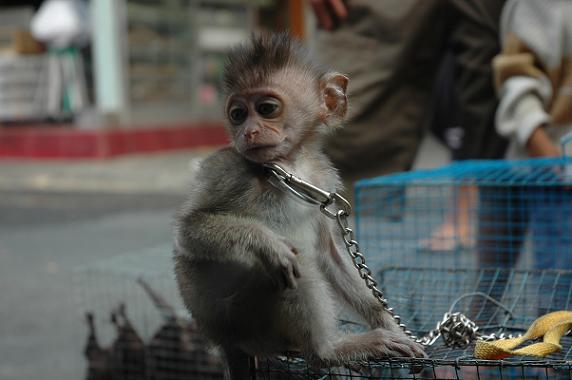LCA Blog
How Much is That Monkey in the Window?
 The problematic trend of keeping monkeys as pets is growing at an alarming rate. From the increasing prevalence of ‘thumb monkeys’ in China, to captive spider monkey YouTube stars being celebrated by millions of viewers—the lack of public awareness about the serious welfare issues inherent to monkey ownership is gravely concerning. Celebrities are also contributing to this issue by normalizing the ‘primates as pets’ craze. Justin Bieber famously abandoned his pet monkey in Germany, after parading the animal on social media, and singer Chris Brown made headlines this month after his infant capuchin was seized by authorities in California.
The problematic trend of keeping monkeys as pets is growing at an alarming rate. From the increasing prevalence of ‘thumb monkeys’ in China, to captive spider monkey YouTube stars being celebrated by millions of viewers—the lack of public awareness about the serious welfare issues inherent to monkey ownership is gravely concerning. Celebrities are also contributing to this issue by normalizing the ‘primates as pets’ craze. Justin Bieber famously abandoned his pet monkey in Germany, after parading the animal on social media, and singer Chris Brown made headlines this month after his infant capuchin was seized by authorities in California.
While the number of privately owned monkeys in the U.S. is not known due to minimal authoritative oversight of the exotic pet trade, it is estimated to be in the tens of thousands. In many states, obtaining a pet monkey is as simple as perusing an online shop and placing an order for the animal of your choice—no permit required. Monkey ownership is also financially accessible to much of the public, with many species retailing in a similar price range to popular designer dog breeds.
Yes, baby monkeys are adorable and it is understandable why people are attracted to the romanticized idea of sharing one’s life with a fascinating exotic creature. However, the reality of the wild pet trade is filled with anguish, trauma, and inexcusable cruelty. Ignorance about the suffering of captive monkeys perpetuates further misery for victims of this industry. It is imperative that animal advocates speak up when they see cruelty being glorified as normal and endearing.
Why is it Cruel to Keep Monkeys as Pets?
From the beginning of their lives, monkeys bred for pets are subjected to unimaginable distress. Stolen from the wild or born into breeding facilities where they are considered nothing more than a commodity, infant monkeys are callously torn from their mothers to be sold for the highest profit. Monkeys are highly intelligent animals with complex needs that cannot be met in private homes. Even the most highly regarded primate sanctuaries have difficulty recreating a natural environment for these species. Forcing wild animals to live in an apartment or house is unjustifiably cruel and displays blatant disregard for their wellbeing. In this environment, monkeys are unable to exercise natural behaviors and routinely fall victim to psychological disorders brought on by the overwhelming stress of captivity.
Furthermore, when monkeys grow into adults, they often become unmanageable and dangerous, a far cry from the affectionate pets that owners hope for. Many species of monkeys can live upwards of forty years, and it is disturbingly common for these animals to be relinquished to roadside zoos or unlicensed exotic pet dealers, sentencing them to a lifetime of torment and despair.
How Can Animal Advocates Help This Issue?
Social media is one of the primary factors fueling the exotic pet trade. While monkeys you see online may appear to be adored by their owners, it is important to remember the fact that these animals are being deprived of everything that is natural and important to them. When you see photos and videos of pet monkeys displayed on social media platforms (Instagram, YouTube and Facebook are the most common outlets), please leave a detailed comment explaining to other viewers why monkey ownership is cruel, not cute.
Additionally, if you suspect a monkey is being kept as a pet illegally, contact local law enforcement immediately.
When you subscribe to the blog, we will send you an e-mail when there are new updates on the site so you wouldn't miss them.












